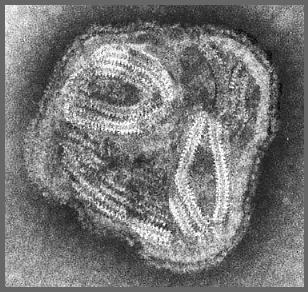The family of Paramyxoviridae contains viruses that induce a wide range of distinct clinical illnesses in humans.
These include
measles virus, which in rare instances is followed by subacute sclerosing panencephalitis (SSPE);
mumps virus, which has symptoms of parotitis, orchitis and encephalitis, and the
parainfluenza viruses which are respiratory pathogens.
Virions are enveloped and enclose a helical nucleocapsid containing single-stranded RNA.
Most virions are roughly spherical (about 200nm in diameter) but they can be much larger and more pleomorphic.
The virus envelope is a lipid bilayer, studded with virus encoded glycoproteins which have properties of haemagglutination and fusion (the F protein).
By transmission electron microscopy, and
negative staining, the helical ribonucleo-protein capsid has a "herring-bone" appearance.
© Copyright Dr Linda M Stannard, 1995
This page was written by Dr Linda Stannard, on behalf of the Division of Medical Virology, UCT.
In Memory of Dr Linda Stannard, 10 May 1942 - 17 October 2016
For re-use of and queries about Dr Stannard's images, please contact Dr Stephen Korsman at stephen.korsman@uct.ac.za.
Recipient of Key Resource Award



